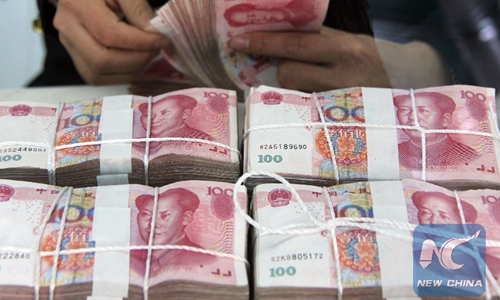HOME >> SOURCE
Benchmark shift for floating-rate loans will further cut financing costs: experts
Source:Global Times Published: 2019/12/29 20:27:56

File Photo: A worker counts Chinese currency renminbi banknotes at a bank in Tancheng County of Linyi City, east China's Shandong Province, April 11, 2013. Photo:Xinhua
China's central bank is driving further use of the loan prime rate (LPR) by making it a new benchmark for pricing existing floating-rate loans, a step that experts said will reduce companies' financing costs as the LPR is expected to be reduced next year in line with the country's macroeconomic regulation.
But the central bank reassured that shifting of the pricing benchmark won't change the actual individual mortgage rate.
According to a statement released by the People's Bank of China (PBC) on Saturday, starting from March 1, 2020, financial institutions should engage in negotiations with existing floating-rate clients to shift from the original contractually stipulated pricing method to the use of the LPR as the pricing benchmark.
The transition process should be completed before the end of August 2020, the statement read.
The PBC also noted that starting from 2020, domestic financial institutions don't have to sign floating-rate loan contracts using the benchmark lending rate as the pricing reference.
The PBC launched last round of LPR reforms in August 2019 as part of its market-oriented reforms of China's interest rate regime.
Nearly 90 percent of new loans are using the LPR as the pricing benchmark, but a large portion of the existing floating-rate loans still referred to the benchmark loan rate for pricing, which "cannot reflect the changes of interest rates on the markets" in a timely way, according to another PBC statement.
As the LPR is lower than the previously applied benchmark interest rate, shifting of the pricing benchmark to the LPR can help reduce companies' borrowing costs, experts said.
"China would reduce the LPR by means of monetary policy adjustment to achieve the goal of lowering companies' financing costs. As China currently adopts a stable monetary policy that tilts toward loosening, the LPR is expected to be reduced further next year and companies' financing cost will decline further as a result," Liu Xuezhi, a senior economist at the Bank of Communications, told the Global Times on Sunday.
The PBC nevertheless stressed that when banks shift toward the LPR as the new benchmark pricing rate, the interest rate on personal commercial property loans should remain unchanged "to implement the regulatory requirements on the real estate market."
Posted in: MARKETS